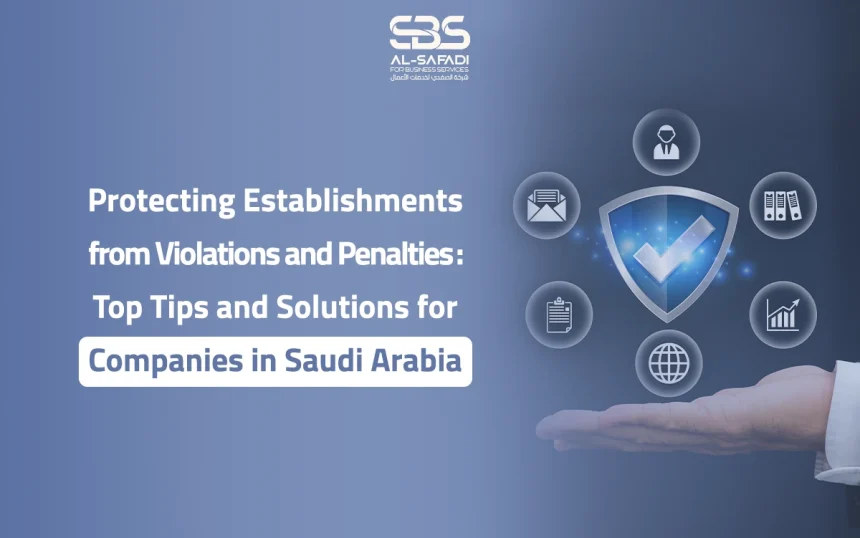
With the rapid economic development and regulatory transformations in Saudi Arabia, businesses must pay close attention to protecting their establishments from violations and fines.
Given the increasingly complex regulatory environment and stringent legal requirements, ensuring compliance with the law is essential for business continuity and sustainable growth.
In this article, we will explore the best practical tips and solutions that help Saudi businesses avoid violations and fines while safeguarding their establishments.
The Importance of Compliance in a Competitive Market
The Saudi market is highly competitive across various sectors. Companies must fully understand the laws and regulations governing their business activities. The real risk lies in violations, which can lead to hefty fines and damage to a company’s reputation.
This article will outline key strategies and best practices to help businesses protect their establishments, strictly adhere to regulations, and effectively avoid violations and fines.
1. The Importance of Establishment Protection in the Modern Regulatory Environment
A. Regulatory and Economic Challenges
Saudi businesses face multiple challenges due to ongoing regulatory and economic changes. Initiatives under Vision 2030 have improved the business environment and updated laws, increasing the regulatory requirements companies must comply with.
To adapt, businesses must implement internal mechanisms that ensure compliance with legal and professional standards. This safeguards smooth operations and prevents penalties or financial fines.
B. The Impact of Violations and Fines on Businesses
Legal violations are not just administrative issues; they directly impact business operations and corporate reputation.
- Financial fines can be significant, affecting cash flow and future investments.
- Trust and credibility between the company, its customers, and partners may be compromised.
Ensuring compliance is therefore critical to maintaining long-term business success and expansion.
2. Fundamentals of Legal Compliance for Saudi Businesses
A. Understanding the Legal and Regulatory Landscape
Businesses must develop a deep understanding of the legal framework governing their industry, including:
- Staying updated on regulatory changes.
- Consulting legal experts specialized in corporate law.
- Conducting internal training workshops to educate employees on compliance requirements.
By integrating legal principles into daily policies and procedures, companies can foster a culture of compliance.
B. Implementing Internal Control Systems
Effective internal control systems are crucial for regulatory compliance. These include:
- Developing a policy and procedures manual aligned with legal regulations.
- Conducting regular employee training on legal obligations.
- Using digital monitoring systems to track department performance and detect potential violations early.
Such systems help businesses proactively address weaknesses and mitigate compliance risks.
3. Practical Strategies to Avoid Violations and Fines
A. Conducting Regular Internal Audits
Regular audits are essential for identifying and addressing compliance gaps. Audits help in:
- Identifying weaknesses in internal systems.
- Detecting legal loopholes that may lead to violations.
- Enhancing compliance procedures based on audit findings.
B. Investing in Technology and Digital Solutions
Technology plays a vital role in managing compliance and monitoring business operations. Key digital solutions include:
- Risk management software to detect and prevent violations.
- Legal compliance tracking systems to stay updated on new regulations.
- Data analytics tools to predict potential compliance risks.
By adopting these technologies, businesses can improve accuracy, streamline administrative processes, and prevent violations.
C. Maintaining Open Communication with Regulatory Authorities
Ongoing dialogue with regulatory bodies is a strategic step in ensuring compliance. Businesses should:
- Hold regular meetings with government representatives to stay informed about new requirements.
- Participate in workshops and seminars organized by regulatory bodies.
- Seek legal consultations when necessary to avoid potential violations.
This approach ensures businesses remain informed about the latest regulations and can implement them effectively.
D. Training and Developing Human Resources
Compliance cannot be achieved without investing in human capital. Companies should:
- Organize specialized legal and administrative training for employees.
- Encourage staff to stay updated on regulatory changes.
- Establish internal compliance teams to monitor legal updates and ensure adherence.
By raising awareness among employees, businesses can minimize violations and achieve long-term compliance.
4. Innovative Solutions for Enhancing Establishment Protection
A. Establishing an Internal Compliance Unit
One effective solution is creating an internal compliance unit responsible for:
- Monitoring regulatory updates.
- Preparing regular compliance reports.
- Recommending improvements to internal systems to mitigate legal risks.
This unit serves as a link between senior management and regulatory bodies, facilitating timely decision-making.
B. Leveraging External Legal Consultations
Beyond internal efforts, businesses can benefit from external expertise by:
- Partnering with law firms specializing in Saudi corporate law.
- Consulting financial audit firms to review internal compliance processes.
- Working with legal risk management advisors to enhance regulatory adherence.
This collaboration provides businesses with a well-rounded strategy to ensure compliance and avoid financial penalties.
C. Developing an Emergency Legal Response Plan
Companies should have a rapid response plan for handling legal violations or fines. A comprehensive plan should include:
- Immediate actions to address violations.
- Assigning a specialized team to communicate with regulatory authorities.
- Establishing a review mechanism to update internal policies based on compliance incidents.
This approach minimizes damage and turns compliance challenges into learning opportunities.
5. Case Studies of Successful Compliance Strategies
A. Success Stories of Leading Saudi Companies
Several major companies in Saudi Arabia have successfully reduced violations by implementing:
- Strong internal control systems.
- Advanced compliance technologies.
- Regular employee training programs.
These companies have significantly decreased compliance breaches, saved substantial amounts in avoided fines, and enhanced their market reputation.
B. Local Case Studies
Research shows that businesses with dedicated internal compliance teams reduce legal risks by up to 40%, compared to companies lacking structured compliance programs.
6. Challenges and Opportunities in Compliance Implementation
A. Challenges
Despite the benefits, implementing compliance strategies presents challenges, including:
- The high cost of compliance technologies and legal consultations.
- The need for continuous monitoring of evolving regulations.
- Resistance to change from employees or departments reluctant to adopt new systems.
B. Opportunities
On the other hand, strong compliance offers significant advantages:
- Improved business reputation, attracting investors and partners.
- Increased operational efficiency through streamlined processes.
- Expansion potential, as legally compliant companies can grow in a stable regulatory environment.
7. The Role of Government and Industry Bodies
A. Government Initiatives
Saudi regulatory bodies have played a crucial role in updating laws and supporting businesses in compliance efforts through:
- Issuing clear legal guidelines for businesses.
- Organizing awareness campaigns and training programs.
- Offering financial incentives for companies demonstrating high compliance standards.
B. Industry and Legal Advisory Support
Apart from government efforts, industry associations and legal firms also support businesses by:
- Providing specialized legal consulting services.
- Offering training programs to enhance employee compliance awareness.
- Conducting research and case studies on best compliance practices.
8. Practical Compliance Tips for Businesses
A. Developing a Comprehensive Compliance Strategy
Businesses should implement a strategic compliance plan that includes:
- Regular risk assessments to identify legal vulnerabilities.
- Clear development goals for improving compliance.
- Allocating financial and human resources for compliance programs.
B. Utilizing Advanced Technologies
Companies should adopt modern compliance technologies such as:
- AI-powered risk assessment tools.
- Automated internal audit systems.
- Centralized legal information platforms for company-wide access.
C. Promoting a Compliance-Oriented Corporate Culture
- Raising awareness through employee workshops and incentives.
- Recognizing and rewarding employees who enhance internal compliance.
- Hosting internal awareness sessions on the importance of regulatory adherence.
D. Continuous Monitoring and Performance Evaluation
- Holding regular compliance review meetings.
- Using Key Performance Indicators (KPIs) to measure compliance effectiveness.
- Conducting internal surveys to assess employee understanding of compliance policies.
Conclusion
Protecting establishments from violations and fines is crucial for sustainable business growth in Saudi Arabia. By adopting a compliance-driven culture, leveraging technology, and investing in continuous training, companies can ensure long-term stability and success in a rapidly evolving regulatory landscape
